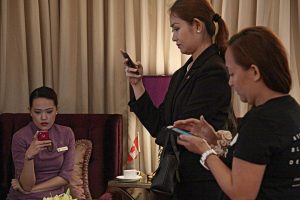Preparing the workforce for the digital job market

JOHN SCHNOBRICH-UNSPLASH
By Brontë H. Lacsamana, Reporter
THE EMPLOYMENT LANDSCAPE has forever changed due to the coronavirus disease 2019 (COVID-19) pandemic, something the new administration must address, especially for a workforce that is still struggling to adapt to the new normal.
In this episode of B-Side, multimedia reporter Brontë H. Lacsamana taps the ideas of Philip A. Gioca, the country manager of online job portal JobStreet Philippines, against a backdrop of digitalization and automation threatening to transform many people’s jobs.
“Early movers and fast movers are becoming the real deal nowadays,” he said, adding that various industries are recognizing the demand for skills.
On June 12, the Department of Labor and Employment (DoLE) offered more than 120,000 jobs nationwide in an Independence Day job fair while JobStreet and the Department of Trade and Industry (DTI) held a virtual career fair from June 13 to 17.
E-commerce platform Shopee started an apprentice program for tech talent in 2021, while the Philippine Business for Education and Citi Foundation launched in 2022 a training program in artificial intelligence and cloud computing, among others.
Though efforts of such private and public institutions do empower workers, Mr. Gioca posted that it will take a change of mindset for the Philippines to truly adapt to the changing work environment.
“This is the time where employers or companies need to really understand what’s really happening on ground,” he said.
Benefits need to be adjusted for a changing economy.
A recent study by e-commerce website iPrice group found that the highest paid entry-level workers in the digital field, like junior project managers and junior UI/UX (user interface or user experience) designers, can barely afford to rent a one-bedroom apartment in the Philippines’ central business districts (CBDs).
Add all the other stressors: the rising prices of commodities and gasoline, poor public transportation, and expensive internet and healthcare services.
“Benefits have changed to internet subsidy, working freely — meaning flexible in terms of working, in terms of shifts, in terms of timing. (Employees) would also like additional healthcare benefits not just to cover themselves but also the family,” Mr. Gioca said.
Work-from-home and hybrid setups, which have muddled the lines between one’s work space and personal space, also require mental health support.
By understanding what’s worth the while and effort of employees, companies will be more able to attract talent due to an employee-centered work environment, he added.
In its “Southeast Asia: Rising from the Pandemic” report published in March 2022, the Asian Development Bank (ADB) concluded that labor market scarring due to the pandemic worsened an already-wide gap between employee skills and workplace expectations.
Both training programs and social protections are needed to ease this gap, the ADB said.
Human resources (HR) services company Sprout Solutions also found in a survey in June that HR professionals’ wish lists include systems that will automate personnel functions, mental and physical health resources, and allowances for transportation, electricity, and internet.
This “Great Reshuffle” of priorities is not only an opportunity for jobseekers to upgrade skills, but also a chance for employers to re-evaluate the role of teams in the company, according to Mr. Gioca.
He explained that 53% of employees now prefer a remote work setup while 41% would rather move to a more affordable location, such as in the provinces, to save more.
“The big question that’s evolving now is, is my company or my work worth it?” he said.
Future-proofing the workforce to withstand automation.
JobStreet’s 2021 study with Boston Consulting Group on the global talent market found that customer service and administration roles may be obsolete in the next three to five years.
“You need to prepare for contingencies for your employees because, sooner or later, because of digitalization and automation, those roles will diminish,” said Mr. Gioca.
A quarter of jobs in outsourcing and electronics will also be affected, but this will be offset by new roles within those industries, the ADB also said in its report.
In September, leaders from the Philippine business process outsourcing (BPO) industry revealed partnerships with the Department of Information and Communications Technology (DICT) to upskill employees in order to address industry demands.
Mr. Gioca of JobStreet believes the approach should no longer be to focus only on so-called “in demand” industries, since upskilling demand has become unpredictable, ever-evolving, and essential everywhere, whether one is a nurse or in tech.
Upskilling, reskilling, and digital learning must be pushed for the job market to keep up with the times, he said. While industries like information technology (IT), healthcare, and science quickly caught up, others are still struggling.
Jobseekers can also easily access platforms like YouTube, Go1, Coursera, and FutureLearn, due to companies and institutions being aware of the upskilling need.
Online training service Coursera, for example, committed in 2021 to more partnerships with Philippine businesses, schools, and government to build accessible, mobile-friendly learning experiences, after recording 85% year-on-year growth in the Philippines.
As of 2022, 1.5 million Filipinos have registered with Coursera, which offers separate programs for businesses and for campuses.
These massive open online courses (MOOCs) shot up over the pandemic with students and working professionals alike availing of them whether in their free time or as an opportunity presented in the school or workplace, Mr. Gioca said.
“Availability nowadays is not an issue because we have seen in the last two years a proliferation of free online training,” he added.
Don’t forget soft skills.
The Philippines ranked 51st out of 134 economies in the Digital Skills Gap Index 2021 released by multinational publishing group Wiley, based on indicators of how prepared an economy is in the digital skills needed for growth, recovery, and prosperity.
When it comes to what kind of training is needed, hard skills like coding, programming, and updated know-how in technical industries should definitely be improved, but soft skills have become in demand too, according to Mr. Gioca.
Critical thinking and active learning skills, for instance, help build an environment where teams easily learn new technologies and eventually better connect with others online.
“How do you now monitor just at home looking after your teams? How do you problem-solve? These are the things now that are very important,” he said.
Technology company HP Philippines also said in June that hybrid setups mean teams must be well-versed in cybersecurity.
Companies must “upgrade their own hardware and software and brief employees on cyber threats and how to respond to them,” HP Philippines said.
Mr. Gioca added that, without teamwork and critical thinking skills tailored for remote setups, employees might not be equipped to do their best work and face problems.
“You have to reintegrate yourself, your employees, to teams, because they have been individuals, working in an environment.… How do you now communicate and engage them, because you will never see them while they’re working?” he said.




